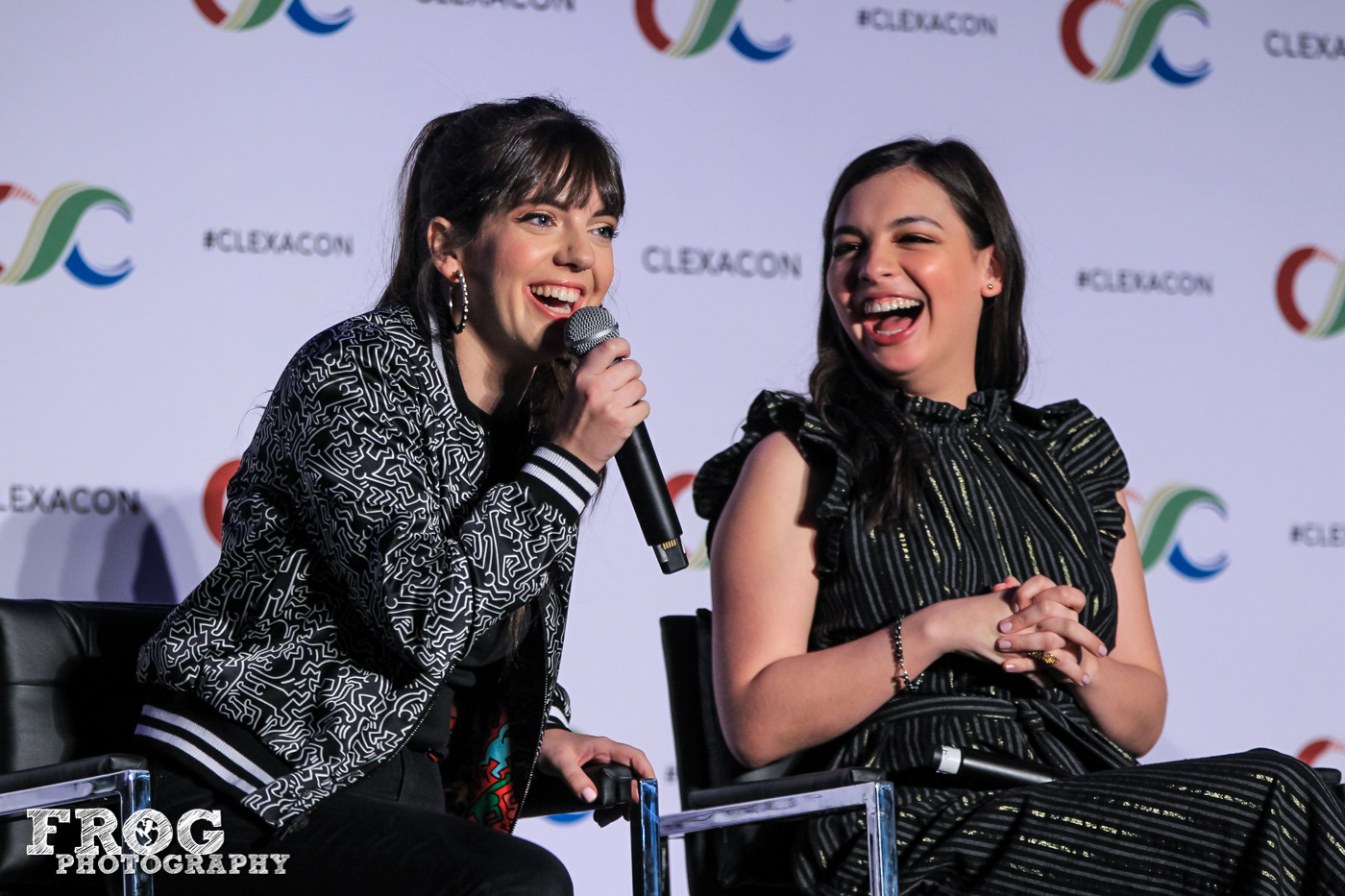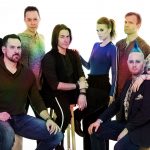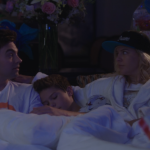ClexaCon: Interview with One Day At A Time’s Isabella Gomez & Sheridan Pierce
While the #SaveODAAT campaign is still raging on, I talked with our favorite One Day At A Time on-screen couple, Isabella Gomez and Sheridan Pierce, at ClexaCon 2019 about colorism, non-binary representation, the “Me Too” impact; and Elena and Alex’s relationship.
 Isabella, this is your second ClexaCon and Sheridan, this is your first. How are you both enjoying it?
Isabella, this is your second ClexaCon and Sheridan, this is your first. How are you both enjoying it?
Pierce: I did not know that it would be so amazing, if that makes sense. I saw pictures and videos from last year, but just interacting with all of the fans has been the best part of this experience. Everyone’s been so kind and nice and I just want to hug everyone.
Gomez: Yeah, it’s lovely. It’s the best here. And I feel like this year’s a little less hectic for some reason. It’s lovely and everybody’s so nice. The panel was phenomenal. Especially with the recent cancellation, it’s so nice to be surrounded by a bunch of love and getting to talk about these characters again.
What inspired you to bring up the colorism scene in Season 2? It was very significant because when you see Latinos, they’re usually lighter skinned.
Gomez: Totally. The reason is came up is that Gloria [Calderon Kellett, executive producer] has a brother who is color caramelo. He’s nice and tanned and she’s blanquita. That’s how Marcel [Ruiz, Elena’s brother] and I are in the show. And she thought: this is perfect and we got to talk about it. There’s so much discrimination within our own community based on color.  Usually if there is a Latinx character, they are white passing because then they can call it representation without actually going all the way into it. We wanted to talk about that and we wanted to talk about the effects of it and how like we can all be Latinx but because of my skin color, I’ll have many more opportunities than my Afro-Latinx brothers and sisters. It was important to talk about it and that’s kind of what our show is about and it made sense within the family to talk about it.
Usually if there is a Latinx character, they are white passing because then they can call it representation without actually going all the way into it. We wanted to talk about that and we wanted to talk about the effects of it and how like we can all be Latinx but because of my skin color, I’ll have many more opportunities than my Afro-Latinx brothers and sisters. It was important to talk about it and that’s kind of what our show is about and it made sense within the family to talk about it.
How would you imagine the first interaction between Carmen and Syd?
Gomez: I feel like it could go one of two ways. They could either really not like each other and there’s jealousy, there’s tension. Everybody wants to be with Elena. I think that Syd and Carmen are weird enough that they could maybe be best friends. And just like that, I’m the jealous one. I’m like, “Excuse me, that’s my sydnificant other and my best friend. I’m the linking factor here. Pay attention to me.” (laughs)
Pierce: Basically it just all links back to you wanting attention (laughs). I feel like they’re both so quirky in different ways that I agree. I think it could work. They could be great friends because you have Carmen with black lipstick, very dead pan and Syd is just kind of goofy. I would love to see that.
Gomez: We’d just have that one scene where Carmen is not saying anything and Syd is ranting, ranting, ranting and ending “right?!”. And Carmen would be like, “Right.” I love that. I just wrote a scene. (laughs)
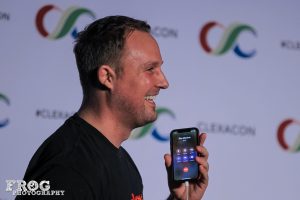
Sheridan, yesterday on the panel, you were talking about an interaction you had on Twitter with a non-binary person before Rita Moreno called in and interrupted you. (laughs) Could you continue your story?
Pierce: Yes. A non-binary fan of the show on Twitter had tweeted me, thanking me for my portrayal of Syd and just saying how much it meant to them that there was a non-binary person who was happy on a show. That really touched me because this is a serious thing. It’s not like there are so many shows that have this representation. There really aren’t. I think the fact that Syd is comfortable with themselves means a lot to a lot of people and to be able to show someone who is non-binary but still, happy and goofy and a three-dimensional character. That’s important. This tweet meant a lot to me and it’s something I definitely think about a lot while playing Syd.
Alex and Elena have really great relationship between the two of them and their relationship is great as it showcases a lot of social issues. Do you have a favorite one?
Gomez: I’ve really loved the “Me Too” scene. I think that’s so important. I have so many issues with the way that men are raised, especially in the Latinx culture where they’re raised to be like, “You have to be the macho man and you don’t get to have feelings and have sex with as many women as possible or you’re not a man.” Then they have all of that in their head that makes for so much toxic masculinity and for them to not be able to see the world as it is and women as humans instead of objects. That was such a cool scene to do because for one, I have a lot of feelings and I love getting to yell at him and two, it’s so important to show these conversations on TV and show little boys being taught from the beginning that no, this is not okay. It doesn’t matter if you think it’s funny and it’s funny to you, it’s not funny to her. It was so cool and I think it started such a huge conversation. People really love that episode. It’s so hard to explain how impactful these little things are because when I was younger, boys would also ask me to like kiss my girlfriends for their enjoyment and I never understood why it made me so uncomfortable. To have that and then show how much it affected this partnership and how much it affected their mental health and their ability to just go outside on a date. I thought it was so crucial to show it from the perspective of a young man learning for the sake of being a better brother, a better son, a better man.
 What feedback from families and children who are dealing with coming out have you gotten?
What feedback from families and children who are dealing with coming out have you gotten?
Gomez: Everybody’s so excited because it’s a fully layered story. It’s not just a very special coming out episode. It’s not just the one time we talk about it, it was a whole process. All of season one was basically dedicated to this coming out process and from then on, it became a whole thing. People are so excited that it’s layered. They’re so excited that it wasn’t sexualized. They’re so excited that Elena still gets to be a kid. I saw that people were really excited about it, her coming out, not because she found somebody who she liked, but just because she was like, “Oh, I don’t need to have somebody to realize that this is who I am.” It’s been lovely. People are so happy. It’s funny because with a character like that, you would expect a little bit of backlash. We were all prepared. We were like, “Okay, here we go.” Not at all. I think in the past three years I’ve seen maybe 10 negative comments. I mean, don’t go on Facebook. I’m not on Facebook and I don’t look at that stuff. But on Twitter and Instagram, I’ve seen maybe 10 negative comments about Elena’s sexuality. In three years… which I think is insane. It also speaks a lot to the writing where they humanize this person and didn’t make it like, “Oh, this is the lesbian.” They made it: “This is Elena who we love and adore and she’s all of these things. And by the way, she likes girls.” I think it really humanized her and normalized it and that’s why people reacted so positively to it.
 Sheridan, you had to come in as an established non-binary gay character. What has been your experience jumping right into that?
Sheridan, you had to come in as an established non-binary gay character. What has been your experience jumping right into that?
Pierce: I actually felt like it was nice to have this established character who didn’t have to explain that they were non-binary. It was pretty much just accepted from the beginning. I thought that was really cool because it was just kind of, “Hey, here’s Syd, this is who they are.” And everyone gets on board with it right off the bat. You do sort of have that introduction with the preferred pronouns scene which is good to have because Penelope and Lydia are kind of confused. But everyone accepts it and adopts the pronouns right away. I thought it was great how it was done. For me as an actor, it was nice to have a character who knew who they were right away.
When people are watching the episodes, most of the time they’re laughing and then suddenly they’d be crying. From this season, is there a specific episode where you thought: oh, this is going to be a doozy as far as crying when you were reading it?
Gomez: For this season, obviously the scene in the chapel where Elena has her speech that she would have actually liked to have given. Originally it was a lot longer and I was, “Oh, that’s going to hit me right in the soul.” But I think the one that we were almost like that is when we did the table read for “Not Yet” [Season 2 finale]. It was a disaster. Originally it was about 45 minutes. The monologues were so long. Each one-on-one was like three pages long and it was so heartbreaking. You know when you go to watch sad movies cause you want to have that cry and it’s fun. This wasn’t the fun crying. It was actually soul-crushing to the point where the executives got up halfway through and left. […] They left. They didn’t want to see it. Some of our writers walked away. And all of us are sitting at this stable sobbing. I went through a whole box of tissues. We couldn’t get through our monologues because we were crying so hard. The thing about that is, we all love Rita like our family and realistically, Rita is of a certain age. It became a little too real for us. Especially after when we started rehearsing and we had to see her on that bed with all those things, it was so not fun at all, which is why they didn’t make us do a lot of takes because it was awful. That table read wasn’t great.
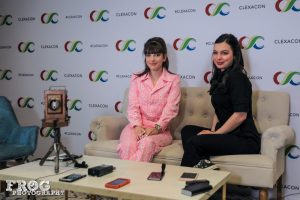 You guys have covered a lot of really tough topics from addiction and PTSD, coming out, not being accepted by a family member. What are some tough topics you guys would have liked to address and cover in an episode?
You guys have covered a lot of really tough topics from addiction and PTSD, coming out, not being accepted by a family member. What are some tough topics you guys would have liked to address and cover in an episode?
Gomez: Not that I would like to, because it’d be tough, but I think right now sexual assault is so prominent. We’ve had touches of it with Penelope’s sexual harassment and all of that story. But I do think it would be interesting to see them deal with it, especially because this family is so open to therapy and so open to taking steps to further your mental health and your mental stability. It’s just prominent. As women, we’ve gone through it, we all have stories and it’s something that we, until now, have had to deal with silently. So maybe it not being a core family member but somebody coming in, I think would be really interesting.
Pierce: That would be really interesting. In terms of Syd, I know that I’ve seen a lot of comments, or at least it’s a discussion within the non-binary community, about presenting: if you present more as female or more feminine or you present more masculine. I’ve seen comments about Syd presenting more feminine. I think that is a discussion that is very interesting and it would be an interesting topic to cover because that is something that maybe people outside of the non-binary community can be confused about as well. It could be a topic that would be good to bring up with Syd.
Gomez: Especially because I feel like it would help so much for the pronouns to make more sense. I know I still make mistakes and call Syd “she” and “her”, which is awful. We kind of made it a game in the cast where if the writers accidentally called Syd “she” or “her” and we’d call them and say, “You messed up! It’s they or them.” (laughs) But I think it is because [Syd] does present more female. I’m very ignorant about that whole situation and I would love to learn more about it. Because of that I think that other people would. too. and it would help understand and make it more clear and understand the process of that.
Obviously the show is available in various countries. Have you noticed differences in how fans from different countries react to your show or the relationships?
Gomez: People generally love us! (laughs) In Brazil, the culture is very much fan-based from what I’ve been told, which is awesome. It’s funny that every country has their own version of it. For example, the butter tub with the food. So many different cultures have that in different aspects. Some are like, “We don’t do the butter tub but we do this and we saw ourselves in that…” Everybody has their own version of whatever it is that we are doing. They identify with it which is cool.
Sheridan, did you know, what kind of impact do you were going to have coming in? Were you prepared at all for what it was going to be like to be playing a queer character with how passionate the queer community is?
Pierce: I definitely knew that non-binary representation on TV was practically nothing. I was kind of nervous because I just knew this character is dating Elena and everyone loves Elena. When I was actually shooting, I was trying not to think about anything like that because you can get in your head about it. After we stopped shooting, I was wondering what was going to happen. Are people going to like me? I don’t know. Similar to Isabella situation, I haven’t really seen a lot of hate and everyone’s been really amazing. So I was like, “Okay, now I can breathe. Thank God.” I will say that I couldn’t really have imagined the level of support that people gave, especially from the non-binary community. That has been really fantastic. But it’s not something I ever could have predicted.
Author: Froggy
Froggy holds a Master of Science degree in Marketing and Management from Dauphine University in Paris. She currently resides in North Haollywood aka Vancouver, Canada where she works as a Project Manager. In addition to covering conventions across North America for The Geekiary, she is a sports photographer for Our Game Magazine.
Help support independent journalism. Subscribe to our Patreon.
Copyright © The Geekiary
Do not copy our content in whole to other websites. If you are reading this anywhere besides TheGeekiary.com, it has been stolen.Read our

